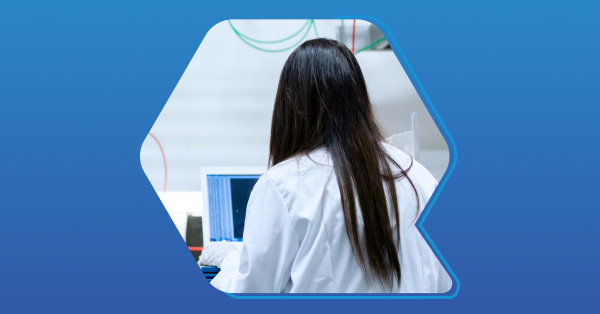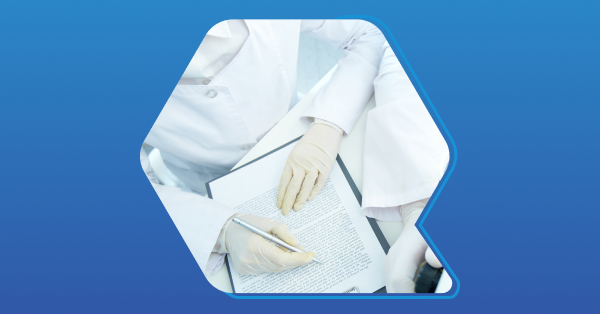How to Select a LIMS for Life Sciences Labs


Biotech has been in a period of explosive growth for the past decade.
In 2023, the biotech/life sciences market was valued at $1.5T and is expected to grow nearly 14% per year to 2030.
A fast-growing market doesn’t just mean more money flowing through the door.
It means rapid growth that can strain your lab and threaten your ability to maintain Good Laboratory Practices (GLPs) that ensure the quality, reliability, and traceability of experimental data and samples. Maintaining GLPs during a period of rapid growth is another story.
Your lab will need real-time tracking of samples and will need to adhere to strict standards for equipment, instrument, and data maintenance.
If your lab is still managing everything with physical notebooks or Excel spreadsheets then you are at risk of falling behind. Fortunately, there’s a platform to automate most of these tasks: a LIMS. Learn more as we break down how a LIMS is perfectly suited to overcome the challenges faced by biotech labs.
6 Challenges Faced By The Biotech Industry
Whether you are working in drug discovery, genomics research, regenerative medicine, or vaccine development, your team can expect to face data integrity challenges that come with rapid growth and a need for automation.
Specifically, these challenges are:
- Workflow efficiency
- Experiment design
- Data management and accessibility
- Quality Assurance
- Regulatory compliance
- Scalability
Workflow Efficiency
Modern biotech labs face complex workflow challenges that extend far beyond basic sample tracking.
Consider an antibody development workflow: researchers must manage multiple cell lines, track hundreds of samples through various screening stages, and coordinate data across instruments. Each step in this process must be documented and represents a potential pitfall for data entry errors or slowdowns for your staff.
Without proper systems in place, even routine tasks like plate management and reagent tracking can become bottlenecks. Not only does this impact efficiency, but it also creates compliance risks if standard operating procedures (SOPs) aren't properly documented.
Experiment Design
High-throughput experimentation has revolutionized biotech research, but it's created new challenges in experimental design and execution.
A single RNA-seq experiment can generate thousands of samples, each requiring unique identifiers, specific handling protocols, and detailed metadata tracking. The challenge isn't just in sample naming – it's in maintaining data integrity throughout the experimental lifecycle.
Tracking the relationship between original tissue samples, extracted nucleic acids, library preparations, and final sequencing data requires robust systems that many labs struggle to implement effectively, especially those bound by manual systems like spreadsheets.
Data Management and Accessibility
It’s estimated that genomics labs process 60 petabytes of data each year, and that is only increasing as labs continue to expand. Managing data at scale is a challenge for any company, but this is especially the case for biotech and life sciences labs.
When you factor in analyzed data, quality metrics, and metadata, the storage and management requirements become enormous. As your lab processes more data the strain increases, especially for remote and distributed teams that need to collaborate without compromising data integrity and security.
Human error, incomplete/inaccurate readings, equipment glitches, and more can lead to incorrect findings about the efficacy and safety of new drugs. With strict regulatory compliance standards overseeing the industry, poor data management and integrity can doom a lab.
Quality Assurance
Managing QA/QC manually or through spreadsheets quickly becomes impossible for life sciences labs.
To meet compliance standards, modern QA/QC systems must integrate equipment calibration logs, maintenance schedules, environmental monitoring data, raw material certifications, personnel training records, batch production records, and method validation documentation.
Manual tracking of these elements becomes virtually impossible as you scale. A single production batch might require dozens of verification steps, each needing documentation and sign-off from multiple stakeholders. The complexity of managing these interconnected quality systems increases exponentially with the size of the operation and the number of products in development.
Regulatory Compliance
Drug discovery is not simply a matter of rapid experimentation. It is a decades-long process paved with regulatory compliance standards and rigorous testing before your work sees the light of day.
Beyond FDA 21 CFR Part 11, labs must often comply with ICH Q10 Pharmaceutical Quality System requirements, GMP/GLP documentation standards, GDPR and HIPAA data privacy regulations (especially for clinical samples), ISO 17025 laboratory standards, and EMA Annex 11 for computerized systems.
Each regulation requires specific documentation, validation processes, and audit trails that must be maintained throughout the product lifecycle. The challenge lies not just in meeting these requirements, but in creating efficient systems that enable compliance without hampering research productivity.
Scalability
A lab scaling up from handling hundreds to thousands of samples weekly must ensure consistent sample processing protocols across multiple shifts, standardized data capture methods, reproducible quality control procedures, and efficient resource allocation.
This requires integrated instrument networks and automated workflow management systems that can grow with the organization. The key is implementing solutions that maintain data integrity and operational efficiency while supporting rapid growth and increasing experimental complexity.
Now that we’ve established the challenges biotech and life sciences labs face, let’s explore how a LIMS can overcome them.
How LIMS Can Help Address Biotech and Life Science Lab Problems
Your staff should be focused on scientific work–not data management, workflows, and other manual tasks.
A LIMS helps labs efficiently manage samples, tests, results, and associated data. By implementing a LIMS, your lab’s data is centralized and manual processes are automated helping you reduce errors, maintain data accuracy and integrity, and ensure compliance with GLPs.
Here are the top ways a LIMS can revolutionize your lab:
- Workflow automation
- Sample management
- Data management
- QA/QC
- Automated documentation
- Audit trails
- System integrations
Let’s walk through each one.
How a LIMS Helps With Workflow Automation
A modern LIMS serves as the central nervous system of laboratory operations, automating workflow scheduling, error monitoring, and management of projects, protocols, and samples.
By integrating systems, a LIMS eliminates data silos and streamlines operations across multiple instruments. Advanced LIMS offer configurable automation capabilities that can adapt to each lab's unique processes - from basic sample tracking to complex multi-step experimental workflows. This flexibility allows labs to optimize their processes while maintaining consistent data quality and regulatory compliance.
QBench comes with a no-code configurable automation engine, giving you the power to make changes as each lab evolves differently and has its own automation needs. We believe automation should be configurable rather than customizable. Many legacy LIMS offer customizable automation engines that require custom code to change, which can slow your lab down and increase costs in the long run.
Sample Management
As we mentioned above, biotech companies routinely handle thousands of samples in their R&D pipeline, making manual tracking virtually impossible.
A LIMS will track samples throughout their complete lifecycle, from receipt through processing and final reporting, while maintaining chain of custody documentation. This significantly reduces manual errors, improves sample traceability, and supports GLP compliance requirements.
QBench offers robust sample management features including sample tracking from receipt to disposal, barcode scanning, organization, and more.
How a LIMS Helps With Data Management
Centralized data storage sits at the heart of a LIMS.
A LIMS validates entries at the point of capture and maintains audit trails throughout each sample's lifecycle. This is especially helpful for distributed research teams by offering secure, real-time access to data while adhering to FAIR (Findable, Accessible, Interoperable, and Reusable) principles.
Adopting a LIMS will help your lab eliminate data silos while ensuring data integrity and regulatory compliance across all operations.
How a LIMS Helps With Quality Assurance and Quality Control
While data storage is key, a LIMS isn’t just for organizing data in your lab.
A modern LIMS with an integrated QMS serves as a comprehensive quality control solution, handling everything from SOPs to calibration records and maintenance schedules.
QBench has a built-in QMS which reduces IT overhead by eliminating the need for separate QA/QC software. This ensures consistent quality processes across laboratory operations while providing the flexibility to adapt to specific quality requirements and regulatory standards.
How a LIMS Helps With Automated Documentation
Keeping SOPs and records in a binder or drawer? Meeting regulatory requirements will be an uphill battle. Fortunately, a LIMS transforms documentation management by ensuring all data follows standardized formats, sample paths are tracked, and SOPs are consistently followed.
Your LIMS will maintain centralized databases of all laboratory activities and can generate customized reports to meet specific regulatory requirements. This eliminates the need for manual documentation while ensuring the accuracy of your records.
How a LIMS Helps With Audit Trails For Efficient Regulatory Compliance
As we mentioned, the massive amounts of data, a distributed team, and the risk of manual entry errors is a perfect storm for failing an audit. To meet regulatory compliance standards, you need time-stamped audit trails documenting who has had access to the data in your lab. And that’s just for starters.
A spreadsheet can’t provide that security, but a LIMS can with a robust set of security and compliance features like:
- Access controls
- Audit trails
- Time-stamped data entries
- SOP storage
And more. QBench takes security and compliance seriously. Combined with an integrated QMS, this ensures that all necessary documentation and audit trails are readily available for regulatory inspections.
How a LIMS Helps With System Integration
A LIMS goes well beyond simply logging data you enter yourself. A LIMS can integrate with all of your lab’s systems, instruments, and software giving you a complete repository of all your lab’s data.
QBench integrates with 50+ popular tools and offers a RESTful API allowing you to integrate pretty much anything with your LIMS. This enables your lab to transform its data into actionable insights.

Which LIMS is the Best Option for Life Sciences Labs?
Of all the LIMS available, which should you choose for your lab?
We’d recommend QBench.
According to G2’s Top LIMS Rankings, QBench is the best LIMS in North America in 2024. QBench is flexible enough to adapt to your unique NGS workflows and automate your genomics lab to eliminate laborious manual processes and outdated, cumbersome systems. As of November 2024, 42% of QBench's reviews are from biotechnology companies.
Among its top features, QBench includes:
- No-code configurable workflows
- Integrations with 50+ popular software tools
- A built-in QMS
- Excellent support
- HIPAA compliance
- Support for 21 CFR Part 11
As said above, QBench stands out with its unparalleled flexibility and robust API, crucial features for labs in the fast-paced biotech industry. Its no-code configurable workflows mean you can adjust processes, integrate new instruments, and adapt to regulatory changes swiftly. QBench laps the competition on the pace of product improvement by releasing product updates every three weeks, many of which are filled with new features that customers requested.
When you choose QBench, you're not just choosing a LIMS but a partnership that will grow with your lab.

Ready to Purchase a LIMS for Your Lab? Request a Free Demo of QBench
For biotech and life sciences labs, there’s no option but to select a LIMS.
Whether your lab specializes in drug discovery, genomics, transcriptomics, agriculture, or vaccine development (and anything in between), the uphill climb to manage your data and maintain Good Laboratory Practices will be prohibitive.
A LIMS is the antidote to these ills you will encounter while trying to manage your data and systems manually. Specifically, a flexible and configurable cloud-based LIMS like QBench.
Click the button below to schedule a free demo of QBench to see it in action. Take the first step to better data, better compliance, and more time for science.






